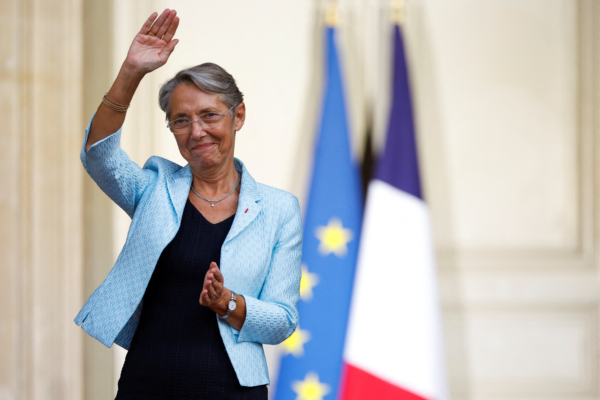 Newly-appointed French Prime Minister Elisabeth Borne gestures as she attends a handover ceremony in the courtyard of Hotel Matignon in Paris, France 16 May 2022.;
Credit: Christian Hartmann
Newly-appointed French Prime Minister Elisabeth Borne gestures as she attends a handover ceremony in the courtyard of Hotel Matignon in Paris, France 16 May 2022.;
Credit: Christian Hartmann
PARIS (Reuters) - French President Emmanuel Macron picked Labour Minister Elisabeth Borne as his new prime minister on Monday 16 May 2022 as he prepares for legislative elections in June - only the second time in 30 years that a woman has got the job.
"I want to dedicate my nomination to all little girls and tell them to go all the way pursuing your dreams", PM Borne said in her inauguration speech.
Recently re-elected Macron, who needs to show he has heard the frustrations of voters expressed by low turnout and big support for the far right and far left, has been looking for a premier with green and social policy credentials.
Such a profile could help counter the challenge mounted by hard-left veteran Jean-Luc Melenchon who achieved a strong third place in the presidential election, giving him the opportunity to rally a broad coalition of left-leaning parties in the 12 to 19 June parliamentary vote.
In a brief inaugural address, PM Borne said that the country needed to act "faster and stronger" to fight climate change and pledged to further work to protect the French's purchasing power, the No. 1 voter concern according to polls.
PM Borne, 61, will be the first woman named as prime minister since Edith Cresson briefly occupied the office during the presidency of Socialist leader Francois Mitterrand in the early 1990s.
"It was really time there was another woman (in that position) and I know Mrs Borne is a remarkable person with a lot of experience...I think it is a very good choice," Ms Cresson told BFM television.
Outgoing Prime Minister Jean Castex, during a transition of power ceremony in the court of the Hotel De Matignon, used the female form of PM Borne's title in a sign of shifting linguistic customs similar to the German "Frau Bundeskanzlerin".
"Madame la Premiere Ministre", he said with a broad smile, adding: "The role (of Prime Minister) is not exempted from public exposure and criticism, dear Elisabeth, people even say that's what it had been created for", said Mr Castex with a twink to what French call the "job from hell" - hard work in the shadow of an omnipresent president.
Earlier in the day, Mr Castex handed in his resignation, paving the way for a Cabinet overhaul after President Macron's re-election in April.
A soft-spoken career bureaucrat who served numerous Socialist Party ministers before joining Presient Macron's government, PM Borne had a brief stint as environment minister in 2019 when she pushed through bicycle-friendly policies.
She then took charge of the Labour Ministry and oversaw negotiations with unions that resulted in a cut to unemployment benefits for some job seekers.
On her watch, unemployment fell to its lowest level in fifteen years and youth unemployment to its lowest level in 40 years.
PM Borne's deep inside knowledge of the workings of the state will help President Macron push through more difficult reforms. She will be tasked with staring down France's muscular unions to oversee his most contested election pledge: raising the retirement age.
"Mrs Borne is against raising minimum wages and for retiring at 65. Here we go for a new season of social mistreatment," Mr Melenchon said on Twitter.
A discreet technocrat who has never run for public office, PM Borne burnished her credentials as a steely negotiator against the trade unions during Macron's first term.
As transport minister in 2017, she held out against weeks of strikes and demonstrations to end a generous pension and benefits system for SNCF railway workers.
"She is a real workaholic, someone who can push on until 3 in the morning and be back again at 7 am," a former PM Borne staffer said.








